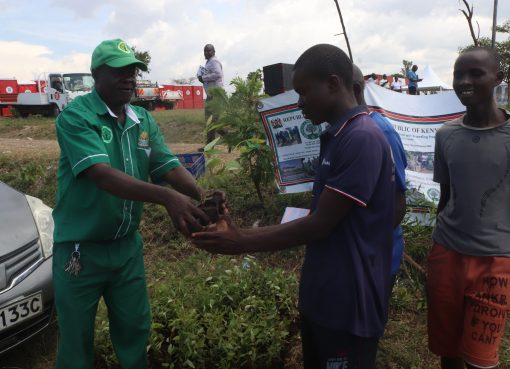In the arid area of Kambiti, Murang’a County a retired juakali artisan has beaten all odds and ventured into the lucrative, but less travelled road of apiculture (bee farming) and is reaping huge returns.
Samuel Kimani aged 76, set up his apiary 12 years ago after retiring from his work in Nairobi and relocating to his native land in Kambiti.

He narrated to KNA at his farm that he purchased 10 beehives, stocked them with bees and set up his apiary about 30 meters from his homestead in his four- acre piece of land.
His late father kept bees albeit for honey to make his traditional liquor and this motivated Kimani to venture into commercial beekeeping. The startup cost him an estimated Sh. 100,000.
“I chose the Kenya Top Bar Hives (KTBH) and purchased 10 of them at Sh. 3500 each” noted Kimani adding that a KTBH is ideal as it comes with a brood box and a honey super as compared to traditional beehives which do not hold or yield much.
He then bought benches at Sh.65000 and set up his apiary.
Twelve years later, Kimani’s apiary under the succulent mango trees that decorate his whole farm is home to 50 beehives, 45 of which are occupied.
The beehives are made out of cypress and pine timber and serve as a permanent home for bees as they have no scent that would repel broods from living inside.
“Each hive produces between 10-12kgs of honey per harvest and to get good profits, honey harvesting is done annually” expounded Kimani
Markedly, bees spend around six months to make brooder and another six months to make super.
While the father of six hopes to harvest up to 100kg of honey next year, he divulged that his last harvest in October yielded 70 Kgs which he filtered and sold at Sh. 900 per Kg.
“I pack in containers and sell my honey in 250gms at Sh. 250, 500gms at Sh. 400, while 1kg costs Sh.900” he disclosed, noting that there is a gap in the local market that he has not managed to exploit.
He contracts a professional honey harvester to extract the honey at Sh.2, 000 after which he filters using a strainer.
Kimani discourages traditional methods of harvesting noting that combs and broods are cut off during harvesting, destroying a generation of bees within a hives colony such that colonies end up spending most of their time and energy rebuilding combs and replacing broods, thus remaining at a redevelopment phase at the expense of honey production.
The proceeds Kimani gets from beekeeping has sustained his family so far and is in the process of building rental houses in his farm.
He notes that a beekeeping enterprise is easy to manage as it requires less labor and anyone with land and some capital can venture into it.
“Make water available in the compound for the bees and watch out for pests as bees are at risk of vacating a hive if they are invaded by pests like ants,” he stressed
In a bid to enhance the environment through pollination, his farm is filled with vegetation and trees. Kimani plans to expand his apiary to accommodate the hives that hang on trees in his farm.
Raw honey straight from the beehive is known to provide a range of health benefits as it contains healthful bee pollen, bee propolis and plenty of antioxidants.
By Florence Kinyua




